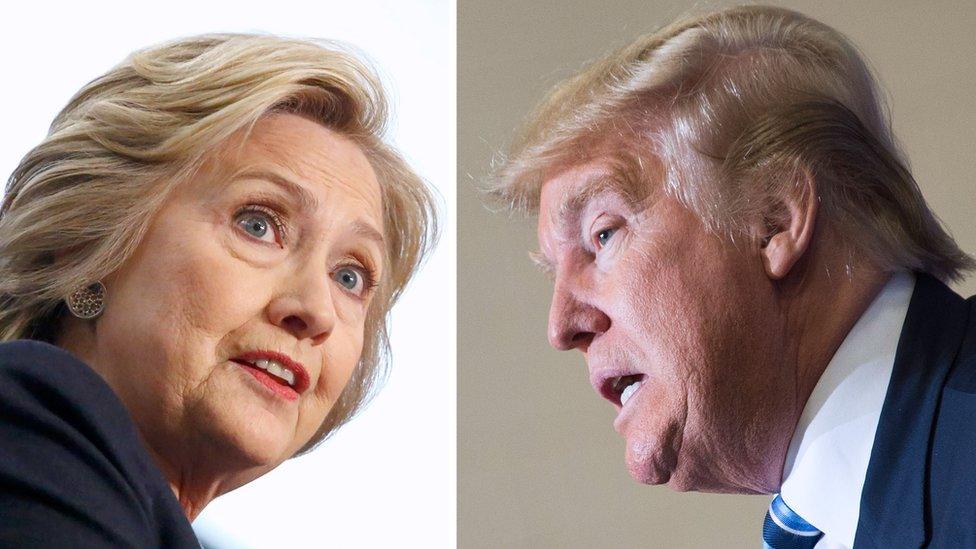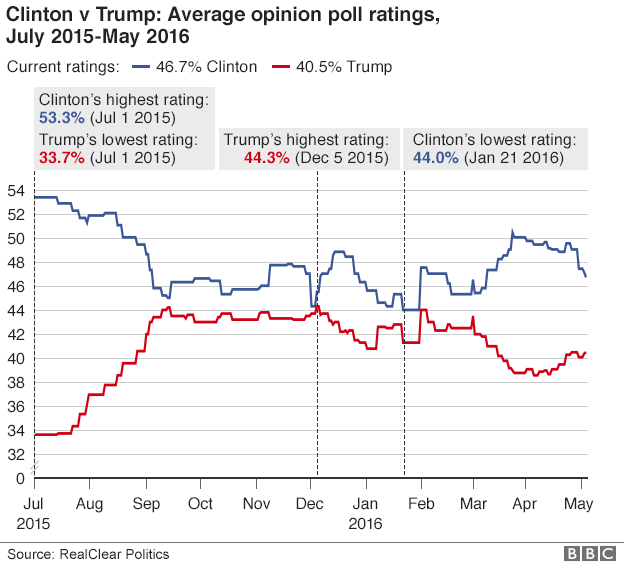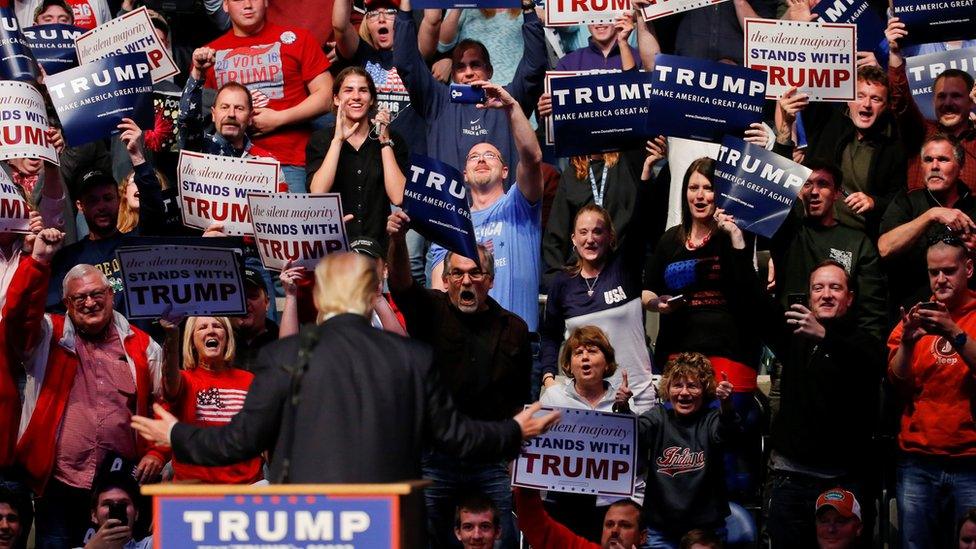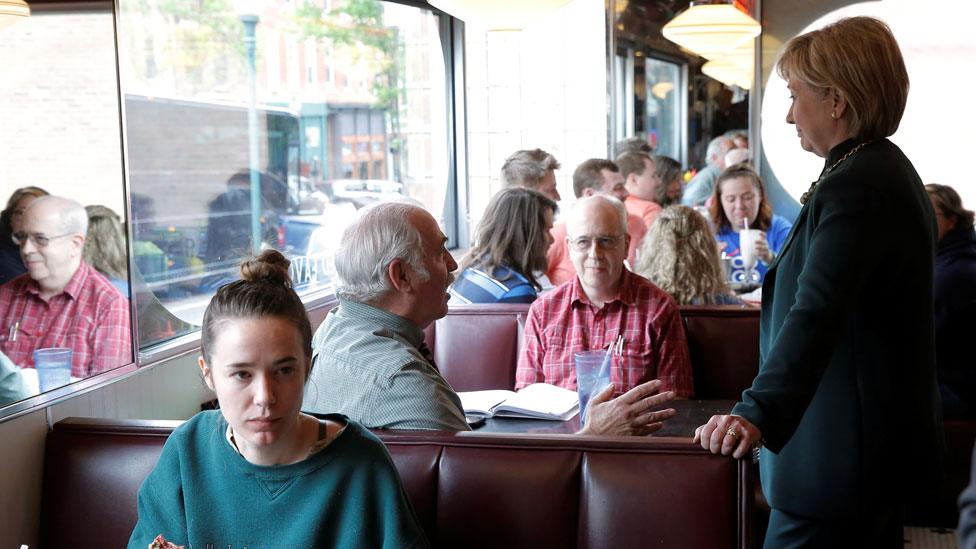US election: What will Clinton v Trump look like?
- Published

Donald Trump implied Ted Cruz's father had ties to President John Kennedy's assassination.
Mr Cruz called Mr Trump immoral, a pathological liar and a serial philanderer. And that was all before lunchtime.
But now that the smoke has cleared and the votes in Indiana have been tabulated, Mr Trump has vanquished his most formidable foe (sorry, John Kasich) and can begin making plans for the Republican convention and the autumn general election campaign.
Meanwhile, Mrs Clinton - despite a loss in Indiana - has to prepare for a very unconventional Republican opponent.
Think the fireworks so far have been eye-popping? This is just the start.
Trump's brick wall
Last week Mr Trump announced he was the presumptive nominee. At the time, that may have been presumptuous. Now it's simple fact.
But if climbing to the top of the Republican heap was an amazingly daunting feat, it will seem like a breeze compared to winning a general election against a determined Democratic foe.

A Republican nominee in the autumn already faces significant electoral headwinds. Democrats have more states that lean their way than the Republicans do. Add in Mr Trump's currently record-setting unfavourable ratings with Hispanic and female voters, and that electoral tilt looks like a brick wall.
States like Florida will be incredibly challenging. Nevada, Colorado and Virginia are all swing states that will be tough to put in play.
There's also the question of money. Mr Trump is rich, but he's not so wealthy as to self-fund the near billion-dollar enterprise that a modern presidential campaign has become. Amassing that kind of bankroll requires a well-developed network of donors - something that Mr Trump just doesn't have at this point.
Can he get there? Perhaps. But he's going to have to lean heavily on the Republican Party infrastructure to do so.
Oh, and about that Republican Party. Although some establishment figures are coming around - including party chairman Reince Priebus, external - the #NeverTrump crowd isn't going to vanish into thin air.
The coming weeks and months will be a time of reckoning for the conservative faithful who view Mr Trump's nomination as a hostile takeover. Will they stay home? Will they, like former John McCain chief of staff Mark Salter, external, look to Mrs Clinton and say: "I'm with her"?

Mr Trump's support has held fast despite negative news coverage and attacks by rivals
Mr Trump may have the ability to reach Americans not normally inclined to vote Republican - blue-collar workers and the economically distressed. The question is whether those gains will make up for losses within the Republican ranks and what could be massive turnout from elsewhere in the Democratic Party.
The Clinton campaign has already begun hammering Mr Trump on his sometimes impetuous personality, late-night tweets and all. They'll try to paint him as a dangerously erratic occupant of the Oval Office.
"Throughout this campaign, Donald Trump has demonstrated that he's too divisive and lacks the temperament to lead our nation and the free world," Clinton campaign aide John Podesta said in a statement on Tuesday night. "With so much at stake, Donald Trump is simply too big of a risk."
Get used to hearing lines like that again and again.
Clinton's empty playbook
Perhaps it's strange to talk about Mrs Clinton's general election prospects on a night when she lost the Indiana primary, but the delegate maths is what it is. She still needs only win around a third of the remaining at-large Democratic delegates to secure the nomination.
It's a prize that eluded her in 2008 and is now in sight. But if she dreamt about being the Democratic standard-bearer for the past eight years, there's no way she could possibly have imagined the nature of her opponent.

Clinton is already campaigning in Ohio, with November in mind
Mr Trump is going to present an unpredictable adversary for the former secretary of state. As the Republican primary has shown, no topic is off the table for him and no possible line of attack out of bounds.
"Her past is really the thing, rather than what she plans to do in the future," Mr Trump told the Washington Post on Tuesday, external. "Her past has a lot of problems, to put it bluntly."
The day before making those comments, Mr Trump had lunch with Edward Klein, a journalist who has made a career of writing inflammatory books about the Clintons and their sometimes chequered history. Chances are, Mr Trump was taking notes.
That Bernie Sanders factor
Then there's that Sanders factor. The Vermont senator has presented an unexpected challenge to Mrs Clinton. His attacks on her past support for trade deals and her ties to the current political establishment have drawn blood.
Could some of his true loyalists stay home or vote for a third party? Could some of his working-class supporters in the industrial mid-west cross over to Mr Trump?

Sanders still draws huge crowds
It seems the Republican was already testing lines of attack in his victory speech on Tuesday night. He brought up Mrs Clinton's support for coal regulations that have caused unemployment in places like Pennsylvania and Ohio. He mentioned that Bill Clinton backed the North America Trade Agreement, which he called "the single worst trade deal".
If Mr Trump can put the Midwest in play, that previously mentioned electoral tilt may not be so imposing after all.
There's no playbook for how a Democrat can run against a Republican like Mr Trump. In some places, such as immigration, he will be well to her right. In other areas, like foreign policy and trade, he could come at her from the left.
Can abortion or the social safety net be wedge issues? Probably not against a man who defended Planned Parenthood and Social Security on a Republican debate stage.
Facing off against Mr Trump is going to take a nimble, creative campaign and candidate. That hasn't always been a strength for the instinctively controlled and cautious Mrs Clinton.
You know you've come to the end of a fireworks show when the shells start bursting all at once.
If the 2016 primary season has been one long piece of pyrotechnical performance art, then Indiana proved to be quite a grand finale - at least for the Republicans.